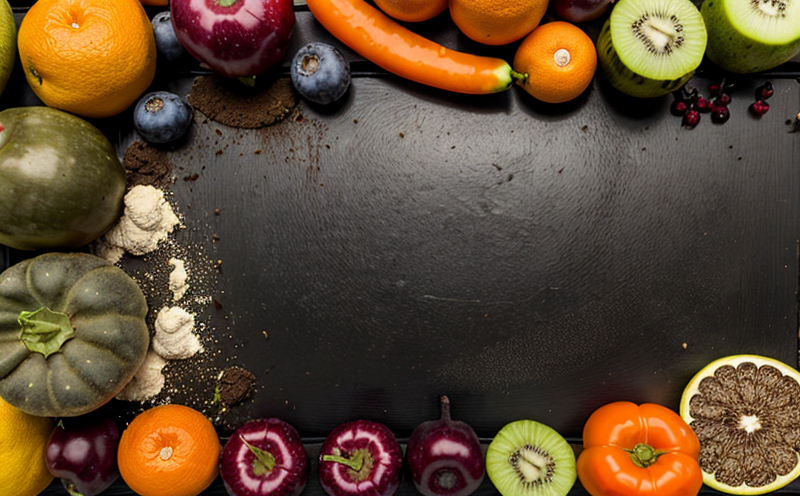ASTM D8196 Antioxidant Profiling in Fruits
The ASTM D8196 standard outlines a method for evaluating the antioxidant capacity of fruit samples. This service is particularly useful in ensuring that fruits meet quality standards regarding their shelf life, health benefits, and safety. Antioxidants play a crucial role in maintaining the freshness and nutritional value of fruits by combating oxidative stress which can lead to spoilage or reduced nutrient content.
Antioxidant profiling helps producers and manufacturers understand how different varieties of fruit retain their protective compounds over time under various storage conditions. This information is vital for optimizing post-harvest handling practices, improving packaging designs, and enhancing product shelf life. By identifying the most effective antioxidants in a given fruit type, companies can better tailor marketing strategies around health benefits or extend distribution windows by adjusting cold chain logistics.
Our laboratory uses advanced analytical techniques such as DPPH (Diphenyl-1-picrylhydrazyl) assays and FRAP (Ferric Reducing Antioxidant Power) tests to quantify the total antioxidant capacity of fruit samples. These methods allow us to measure both water-soluble and lipid-soluble antioxidants present in the fruits, providing comprehensive insights into their overall antioxidant profile.
Sample preparation involves mechanical homogenization followed by extraction using appropriate solvents based on the specific composition of each fruit type. For example, citrus fruits might require a different approach compared to stone fruits due to differences in pulp structure and juice content. After extraction, the resulting solutions are analyzed according to ASTM D8196 guidelines.
Using this standardized procedure ensures consistency across all samples tested, enabling meaningful comparisons between varieties or batches of fruit. Compliance with international standards like ASTM guarantees that our results are accepted by regulatory bodies worldwide, ensuring confidence in both product quality and marketability.
- Customer Impact: By leveraging accurate antioxidant profiling data, businesses can make informed decisions about improving supply chain efficiency, enhancing product development efforts aimed at increasing consumer appeal through health claims, and ensuring compliance with stringent food safety regulations.
The importance of understanding the antioxidant content in fruits cannot be overstated. It directly affects how long consumers enjoy their fresh produce before it starts to deteriorate, thereby influencing both economic factors like inventory turnover rates and environmental impacts related to waste generation.
Our team of experts ensures that every aspect of this process adheres strictly to ASTM D8196 requirements, delivering reliable data that supports sound decision-making processes within organizations involved in fruit production, processing, and distribution. With our services, you gain access not just to technical know-how but also valuable insight into optimizing your operations for enhanced profitability and sustainability.
Eurolab Advantages
At Eurolab, we pride ourselves on offering comprehensive testing solutions tailored specifically to meet the needs of our clients across various sectors. When it comes to ASTM D8196 Antioxidant Profiling in Fruits, here are some key advantages:
- ISO/IEC 17025 Accreditation: Our laboratory is fully accredited under ISO/IEC 17025:2017, ensuring that all our tests are conducted to the highest possible standards. This accreditation guarantees accuracy, precision, and reliability in every measurement we provide.
- State-of-the-Art Equipment: We utilize cutting-edge analytical instruments designed explicitly for determining antioxidant levels within fruit samples. These tools enable us to achieve precise results even when dealing with minute quantities of antioxidants present naturally in these foods.
- Experienced Professionals: Our staff comprises highly skilled scientists and technicians who possess extensive experience working with diverse fruit types under varied conditions. Their expertise allows them to interpret complex data accurately, offering actionable recommendations based on our findings.
- Dedicated Support: Beyond merely performing the tests themselves, we offer ongoing support throughout the entire process from initial consultation through final report delivery. Our goal is to ensure complete satisfaction with each service provided so that clients can focus solely on utilizing their test results effectively.
Choosing Eurolab means partnering with a trusted partner committed to excellence in every aspect of our operations. Whether you need assistance optimizing your current products or developing new ones, we have the resources and knowledge needed to help you achieve your objectives efficiently and cost-effectively.
Quality and Reliability Assurance
The quality assurance process at Eurolab is rigorous and designed to uphold strict standards of accuracy and consistency. Every sample submitted undergoes multiple checks before being analyzed according to ASTM D8196 guidelines. This includes verifying the identity of the fruit type, checking for contamination levels, ensuring proper dilution factors are applied during extraction steps, and maintaining controlled environmental conditions throughout storage.
Once analysis is complete, our results go through an additional review phase where internal quality control measures ensure compliance with international standards before being finalized. We also participate in proficiency testing programs organized by recognized bodies such as A2LA (Accredited Lab Network) to further validate the reliability of our methods and equipment.
In addition to these internal protocols, we maintain close collaboration with industry leaders who provide feedback on our performance regularly. This ongoing dialogue helps us stay current with emerging trends in fruit science while continuously refining our methodologies to ensure they remain relevant and effective.





